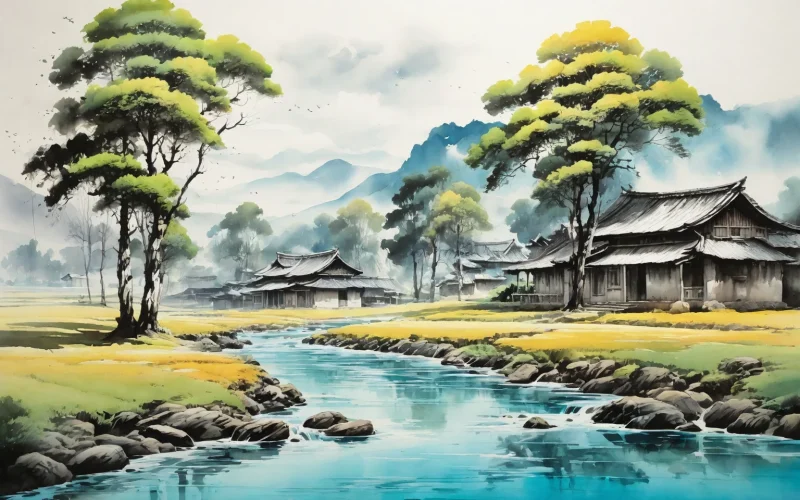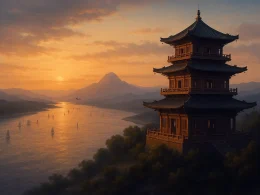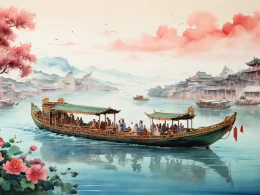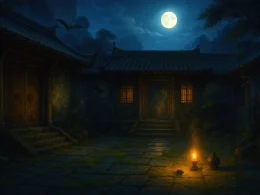East of Huai, the famed capital,
By Bamboo-West, beauty's core -
I halt my steed, this journey's first call.
Past ten-li spring breeze once bore,
Now wild oats green the ruined floor.
Since Tartar steeds spied the river's run,
Dead ponds and old trees still shun
The mention of war. Dusk draws near:
Chilled horns blow through the hollow sphere.
Young Du Mu's praise would turn to fright
Should he return to this sight.
Though skilled in cardamom-song,
Or brothel-dreams sweet and long,
Even he couldn't voice this plight.
The Twenty-four Bridges remain,
Waves sway at heart, cold moon's mute pain.
And peonies by the arches red -
Year after year, for whom they spread?
Original Poem
「扬州慢 · 淮左名都」
姜夔
淮左名都,竹西佳处,解鞍少驻初程。
过春风十里,尽荠麦青青。
自胡马窥江去后,废池乔木,犹厌言兵。
渐黄昏,清角吹寒,都在空城。
杜郎俊赏,算而今,重到须惊。
纵豆蔻词工,青楼梦好,难赋深情。
二十四桥仍在,波心荡,冷月无声。
念桥边红药,年年知为谁生?
Interpretation
Composed during the Chunxi era of Southern Song, this ci poem was written by Jiang Kui as he passed through Yangzhou after failing the imperial examinations in the north. Confronting the war-torn city ravaged by Jin invaders, the poet-channeling Tang dynasty nostalgia, national grief, and personal rootlessness into a masterpiece of "millet grief." Once the "spring breeze for ten li" celebrated by Du Mu, Yangzhou now lay in ruins—its splendor erased, its silence profound.
First Stanza: "淮左名都,竹西佳处,解鞍少驻初程。过春风十里,尽荠麦青青。"
Huái zuǒ míng dū, zhú xī jiā chù, jiě ān shǎo zhù chū chéng. Guò chūn fēng shí lǐ, jìn jì mài qīng qīng.
East of Huai, the famed capital,
West of Bamboo, its beauty perennial—
I dismount here at my journey's start.
Where spring winds once blew for ten li,
Now only wild radish greens the trampled heart.
The poet opens with Yangzhou's glorious past—"famed capital," "beauty perennial"—only to undercut it with the present's "wild radish" overgrowth. This juxtaposition of memory and ruin, rendered through botanical metaphor, encapsulates history's inexorable turns.
Second Stanza: "自胡马窥江去后,废池乔木,犹厌言兵。渐黄昏,清角吹寒,都在空城。"
Zì hú mǎ kuī jiāng qù hòu, fèi chí qiáo mù, yóu yàn yán bīng. Jiàn huáng hūn, qīng jiǎo chuī hán, dōu zài kōng chéng.
Since Tartar steeds spied the river and fled,
Wasted ponds, gaunt trees—even they
Sicken at war's name. Dusk descends.
A lone bugle's chill pierces the air,
All emptiness in this city where glory ends.
War's aftermath dominates here. "Wasted ponds" and "gaunt trees" stand as mute witnesses, while the "lone bugle" (清角) merges auditory chill with existential emptiness. "City where glory ends" (空城) crystallizes the stanza's despair—a single phrase bearing the weight of civilization's collapse.
Third Stanza: "杜郎俊赏,算而今,重到须惊。纵豆蔻词工,青楼梦好,难赋深情。"
Dù láng jùn shǎng, suàn ér jīn, chóng dào xū jīng. Zòng dòu kòu cí gōng, qīng lóu mèng hǎo, nán fù shēn qíng.
Du Mu, connoisseur of splendor,
Should he return now, would start in horror.
Though his "cardamom" verses shone,
His blue-roofed dreams of pleasure—
Even his pen could not measure this grief's pressure.
The invocation of Tang poet Du Mu (杜郎) bridges eras. The hypothetical "would start in horror" (须惊) underscores the city's devastation, while "could not measure" (难赋) admits art's failure before such loss—a meta-poetic moment where the ci form itself seems inadequate.
Fourth Stanza: "二十四桥仍在,波心荡,冷月无声。念桥边红药,年年知为谁生?"
Èr shí sì qiáo réng zài, bō xīn dàng, lěng yuè wú shēng. Niàn qiáo biān hóng yào, nián nián zhī wèi shéi shēng?
The Twenty-Four Bridges remain,
Their arches trembling in water's membrane,
Under a mute, icy moon.
O peonies by the piers,
Year after year—for whom do you bloom?
The finale's lingering images—bridges, ripples, moon—are hollowed of their former joy. The peonies' (红药) unanswered question ("for whom?") echoes the poet's own existential query, transforming botanical persistence into an allegory of futile beauty amid irreparable loss.
Holistic Appreciation
This ci poem interweaves personal sentiment with historical vicissitudes and regional culture, employing an ethereal and refined brushwork to depict the devastation wrought by war and profound nostalgia for a lost homeland. The interplay of past and present, movement and stillness, is masterfully rendered, with phrases like "empty city," "clear horn," "cold moon," and "soundless" carrying particular artistic potency.
Jiang Kui ingeniously adapts Du Mu's poetic imagery to mirror contemporary reality while projecting his own rootless existence onto the war-torn landscape. The poem's delicate aesthetic, melancholic tone, and restrained yet profound emotion are all fully realized here.
Artistic Merits
- Juxtaposition of Past and Present, Blending Real and Imagined: The poet repeatedly draws on historical figures and allusions to contrast with the bleak present, constructing a complex, multi-layered emotional landscape.
- Emotion Projected onto Scenery, Fusion of Feeling and Scene: A classic case of "using joyful imagery to convey sorrow"—symbols like the "Twenty-Four Bridges" and "peonies blooming yearly" (traditionally festive) ironically heighten the pervasive melancholy.
- Ethereal Diction, Crisp and Clear Imagery: Words like "cold," "clear," "empty," and "soundless" typify Jiang Kui's signature "crystalline" ci style—understated in tone yet resonant in meaning.
- Preface Anchoring the Theme: The introductory note contextualizes the poem's genesis, guiding readers through its temporal, spatial, and emotional framework.
Insights
The poem embodies the quintessential charm of classical ci artistry—"subtle yet enduring," with "lingering flavor in every line, lingering meaning in every stanza." It not only lays bare the scars of war but also implores later generations to cherish peace and remain attuned to their times. Confronting ruined pools and aged trees, a silent cold moon, and peonies blooming in vain, the poet's tender backward glance also refracts critical reflection on contemporary reality. For modern readers, this technique of "conveying intensity through restraint, sorrow through stillness" teaches us to comprehend history through aesthetic experience and preserve sentiment through art.
About the poet
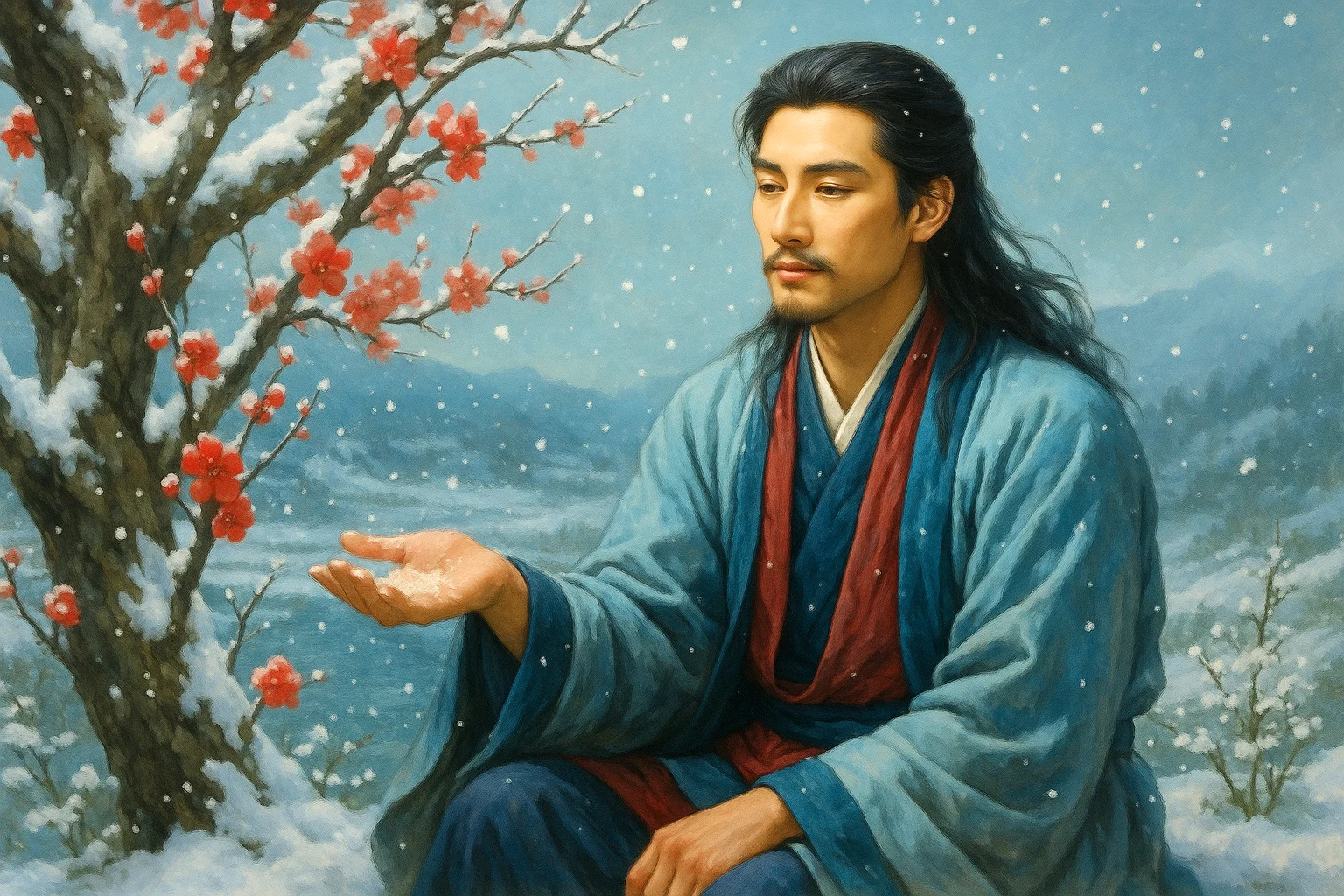
Jiang Kui (姜夔, c. 1155 - 1221), a native of Poyang, Jiangxi, was a Southern Song Dynasty lyric poet and musician. He remained a commoner throughout his life. His lyrics are known for their ethereal and austere style, and his poetry is also highly regarded. Along with Fan Chengda and Yang Wanli, he is celebrated as one of the "Four Great Masters of the Restoration."






